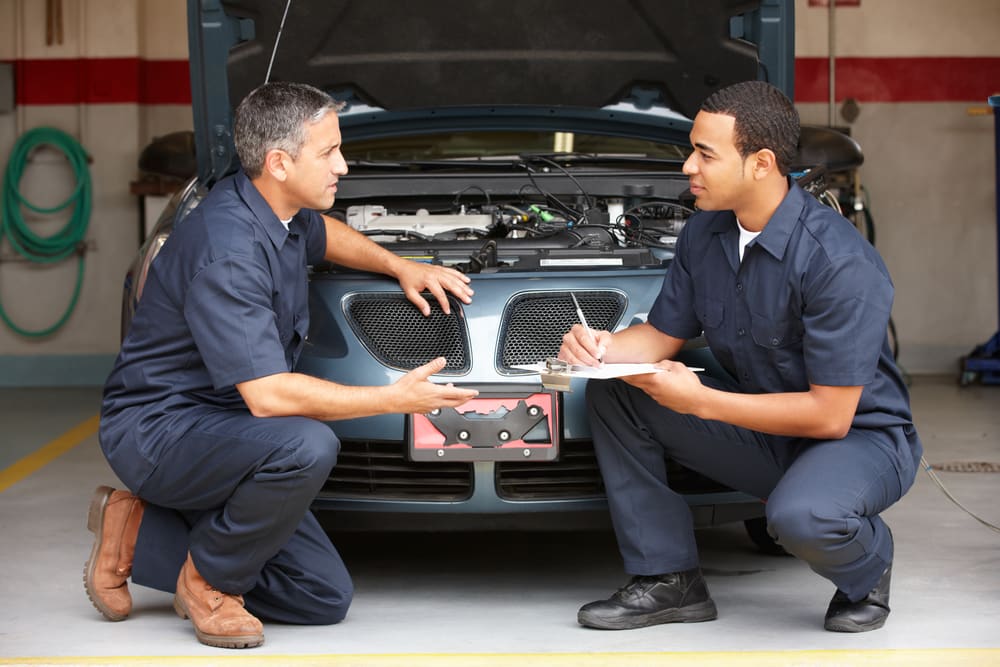

Working in the automotive repair industry has a number of benefits. People who study auto mechanics have a high degree of job security due to the overwhelming prevalence of vehicles throughout the country and the world. Mechanics can live virtually anywhere without problems finding work. Whether in the private sector or for a local, state, or federal municipality, automotive careers are both lucrative and plentiful.
Overview of Auto Mechanics
Auto technicians or mechanics must possess a number of different skills in the process of inspecting, maintaining, and repairing vehicles. At the most basic, technicians will perform simple maintenance tasks such as tune-ups, tire rotations, and oil changes. Auto technicians will often need to use high-tech diagnostic equipment to troubleshoot vehicle problems and diagnose issues. With the high level of computerization in today's vehicles, mechanics must have the understanding and skills to operate computerized diagnostic equipment as well as a firm understanding of the electronic components present in vehicles.
Shifts in Automotive Careers
With shifts to new automotive complexities, automotive technicians need more in-depth training to enable them to work on current vehicles. Specialization is also common within the automotive industry. Instead of one mechanic servicing an entire vehicle, specialists will provide maintenance and repair services for the various systems, including brakes, electronics, electrical systems, fuel systems, and the engine. Mechanics must also participate in ongoing training to learn the skills necessary to work on the latest automotive technology. The National Institute for Automotive Service Excellence tests and certifies technicians. To receive certification, mechanics must take a written test. Technicians must also have a minimum of two years of direct industry experience. Once certified, automotive technicians must retest every five years to maintain their certification.
Responsibilities of Automotive Technicians
As technicians inspect, maintain, and repair vehicles, they will be responsible for many different tasks. Some of these jobs includes connecting vehicle parts or systems to equipment to perform tests. At the conclusion of the testing, the technicians must be able to analyze the test results to determine recommendations for any necessary repairs. Vehicles also need maintenance to prevent costly damage. Some maintenance includes refilling fluid reservoirs, lubricating components, and replacing worn parts.
Another important facet of automotive technician responsibilities involves communicating with consumers. Car owners often lack expansive understanding of automotive technology. This means that mechanics must be able to explain issues to consumers to help them make informed decisions about maintenance and repair. Mechanics must also act in a trustworthy manner to serve customer needs. Credible and ethical technicians who serve their customers fairly and responsibly often gain loyal customers.
Collision Repair Technicians
One important area of automotive technology involves working on the bodies of vehicles. Body repairs are often necessary after car accidents, but this type of work can also be needed due to excessive rust that can come with age. A collision repair technician receives training to repair and refinish vehicles to resolve structural and appearance issues. These repairs include tasks such as realigning frames, removing dents, and replacing body parts. These technicians often specialize in various areas of collision repair. Areas of specialization include frame realignment, metal repair, fiberglass parts, and interior repairs.
Preparing for an Automotive Career
In the past, it was possible to enter the automotive repair industry with little to no formal training. Mechanics often entered the profession immediately out of high school, learning on the job to gain skills. While some people might still try this approach, the advanced technological components of vehicles have changed the landscape of the automotive industry. Most employers now require employees to have some type of formal training, certification, and/or degree. This training can come from community colleges, trade schools, or universities. Preparing for a career in the automotive industry will improve success rates. Students in high school can prepare for this advanced education by working particularly hard in courses in mathematics, physics, computer technology, and English. Any courses that include engineering, technology, and the development of manual dexterity will be beneficial for someone planning a career as an automotive technician.
- Who's Hiring Auto Mechanics?
- Automotive Technology (PDF)
- Earnings in Automotive Technology (PDF)
- Career Facts for Collision Repair Technicians
- Job Market for Auto Mechanics Is Wide Open
- Automotive Service Technician and Mechanic (PDF)
- Automotive Career Choices (PDF)
- The Relationship of Academic Courses to Skills Required of Automobile Repair Technicians (PDF)
- About Auto Body and Collision Repair Technician Training (PDF)
- Test Drive a Career at a New Car Dealership (PDF)
- Automotive Service Technician (PDF)
- AAA Guide to Auto Repair (PDF)
- Four Reasons to Consider a Career as an Auto Repair Technician



